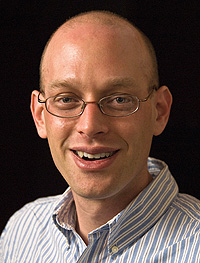Mark Krumholz, assistant professor of astronomy and astrophysics at UC Santa Cruz, has won a prestigious Faculty Early Career Development (CAREER) Award from the National Science Foundation to support his work studying star formation processes and a community outreach project teaching science classes to prisoners at local detention facilities.
The award provides a grant of over $663,000 to fund Krumholz's research and community teaching program over the next five years. CAREER grants are awarded to junior faculty teacher-scholars who show the most promise for lifelong achievement in building integrative research and education programs. Last year Krumholz received one of two Alfred P. Sloan Foundation research fellowships awarded to UCSC faculty.
Krumholz's ultimate research goal is to produce a fully predictive theory for how stars form. In a paper published last year, he answered the long-burning question of how stars larger than our sun can grow past the point where their radiant energy theoretically should repel the dusty materials drawn in to grow the star's mass. With the CAREER grant, he plans to focus on the nuclear reactions within stars and how their energy drives evolution of galaxies, formation of planets, and creation of heavy elements.
The CAREER award will also provide support for the UC Santa Cruz Project for Inmate Education, which Krumholz created last year in conjunction with UCSC Extension administrators and local correction officers. The program offers college courses to inmates confined in county detention facilities. He and other UCSC faculty and graduate students will teach the courses. The project mirrors similar programs he was involved in as a postdoctoral fellow at Princeton University and as a graduate student at UC Berkeley, when he taught courses at San Quentin State Prison. The goal of the program is to bridge the gap between the scientific community and a group of people who have been largely underserved by other educational outreach efforts.
Krumholz joined UC Santa Cruz in 2008 after completing a Hubble, Spitzer, and Council on Science and Technology Postdoctoral Fellowship at Princeton University. He earned his Ph.D. and M.S. degrees in physics at UC Berkeley and his B.A. in physics from Princeton University.



